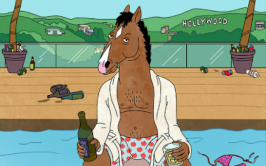
Many fans are eagerly waiting for Netflix to release the third season of “BoJack Horseman,” an oddball comedy. (Courtesy of Flickr)
By Laura Sanicola
There are three things I need more of in my life right now: time, sleep and animated horses.
I’m talking (of course) about the return of what may be my all-time favorite TV show: “BoJack Horseman.” This summer Netflix original is due for a third season, and I am awaiting its release the way restless students in the Class of 2016 are awaiting theirs. The main character, a cynical former sitcom star and animated horse, battles alcoholism, depression and an unyielding case of “I messed my life up,” relatable, at least in part, for college students. BoJack struggles to make himself desirable to friends or romantic partners, but frequently reverts to a meaningless affair with his ambitious, equally depressed agent and animated cat, Princess Carolyn.
It’s strange, but oddly encouraging, to see Netflix putting time and money into a show like “BoJack Horseman.” As the animated surrealist show is jam-packed with narcissistic characters, BoJack is unlikely to grow beyond the die-hard audience that started watching in 2014. However, by investing in talented actors and animators, Netflix has deftly produced one of the best programs on the computer screen this year.
That’s because “BoJack Horseman” is full of oddities: it is animated and funny but filled with heavy emotion. It is a harsh satire that is executed as a lighthearted sitcom. The show might introduce us to a “Dada” type world in which human beings and anthropomorphic animals coexist, but the world of “BoJack Horseman” is built on uncomfortable truths with characters that ring with authenticity.
Season two picks up where we left BoJack (voiced by Will Arnett): pursuing the opportunity to revive his career as a result of the new release of his tell-all biography. He used that opportunity to finally star in his dream project, the movie biopic Secretariat. At the same time, his former biographer Diane Nguyen (Alison Brie) finds married life with a hyper labrador retriever Mr. Peanutbutter (Paul F. Tompkins) to be a greater struggle than she realizes. BoJack’s agent Princess Carolyn (Amy Sedaris) finds herself still cleaning up after BoJack while balancing her dysfunctional love life, while BoJack’s long time roommate Todd (Aaron Paul) falls into another series of crazy misadventures.
This might ring familiar to the show’s original fans, but creator and show-runner Raphael Bob-Waksberg subtly gives each person in the supporting cast a chance to work individually and thrive separately from BoJack himself. BoJack’s off-and-on relationship with both Diane and Princess Carolyn has been abandoned, and he shares surprisingly little screen time with Todd, previously his chief sidekick. Instead, BoJack is given more of an opportunity to showcase the many stages of middle-aged depression.
Last season recreated much of the atmosphere that made the first season ground-breakingly funny and enthralling. The sharp jokes were delivered quickly and the dialogue was even more biting as the writers become more comfortable with their actors’ rhythm. The dialogue between characters is so quick and layered that it has taken me months to unpack the humor. There were fewer cheap jokes about the nature of the anthropomorphic world being made (though Mr. Peanutbutter’s struggle with a pet cone is a masterpiece), and a better exploration of the internal logic of this anthropoid animal farm. For example, there’s a smart look at ethical chicken farming when Todd falls for a fugitive hen, bred-to-be-eaten by a better-educated chicken. “Of all the places that will eventually kill her, Gentle Farms seemed like the best,” he’s told.
“BoJack” does not fail to deliver some mindless pleasures, including Mr. Peanutbutter’s new J.D. Salinger themed game show, but the horse himself carries the season’s emotional weight. Though he appears to be committed to a new positive life approach, the moments when he inevitably spirals into deep flaws and crippling self-consciousness lead to commitment issues with his owl girlfriend (Lisa Kudrow)—which are weirdly moving while never feeling contrived or emotionally manipulative. Still, I am drawn to the show’s emphasis on human failure. BoJack’s existential struggle makes life harder for himself by pushing people away. It is hardly a reason to laugh, except that he is a cartoon horse, but it is not a foreign experience.
So no, “BoJack Horseman” is not a traditional comedy, but an important one. If Netflix’s commitment to the show remains unwavering, I’m deeply impressed. Now bring me season three.
